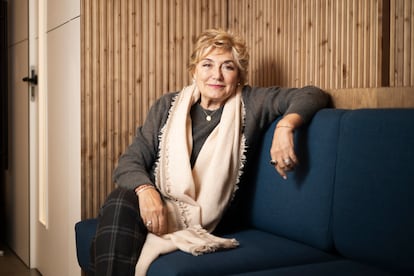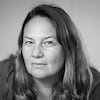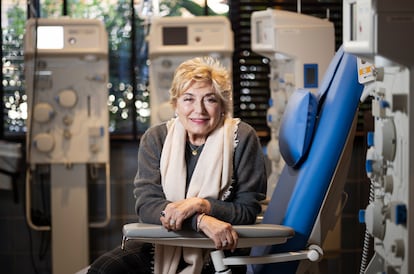Mercè Boada, neurologist: ‘The more we learn about Alzheimer’s, the more able we will be to decide when we want to stop living this way’
The doctor points out that the next 10 years will be decisive in the fight against the disease


To talk to Mercè Boada is to be filled with optimism, despite the fact that her Ace Alzheimer Center in Barcelona is full of patients. The 76-year-old is an expert in fighting Alzheimer’s. As a neurologist, co-founder and medical director of Ace Alzheimer Center, Boada has just received the gold medal for scientific merit from Barcelona City Council: “Awards surprise me. My professional and human profile is the same as any ordinary person. I am not a born scientist, but I know where science has to go.”
Question. Will there be a drug for Alzheimer’s soon?
Answer. Yes. The drugs that we have been using until now have been the basic pillar for treating patients and for developing other drugs, but they have been severely criticized. Indeed, they do not cure [the disease], but they have allowed us to slow it down as much as possible and learn to diagnose.
Now we have new drugs that clear the amyloid beta [protein] in a shorter period of time and reduce the deterioration. It is a statistical concept. For example, if I have a slope of deterioration and these medications have reduced this slope, we have improved between 27% and 30%. [My condition will] continue to decline, but I have smoothed out this decline, and I will have a better quality of life and cognitive survival for longer.
Q. How does a family member understand that cognitive impairment is reduced by 30%? What does this look like in practice?
A. It’s very difficult because they ask you: “But will I be better?” Yes, above all, you will be better for longer. And that is important because life goes on and drugs change. I water my plant every day so that it makes it to next spring.
Q. When will we lose the fear of Alzheimer's?
A. Why do we now have little fear of breast cancer? Because we have treatment. I am very optimistic: when we have the experience of two years of treatment with these new drugs, society will lose its fear.
Q. For years attention has been focused on trying to stop the cognitive deterioration of a person in the advanced stages of the disease, but a decade or more ago, the scientific community took a turn and began to focus on treatment to prevent the development of the disease. Have you been looking in the wrong place?
A. No, we weren’t looking in the wrong place. If I go back to the 1970s, everyone focused on finding out how many people had it, and big studies began. What did we want to know? When it started, how long it evolved, what predominance was there of men and women, and what comorbidities were involved.
And this is still very important. If we want global health prevention, there are 10 elements in which we can reduce the prevalence and even the incidence of deterioration: cardiovascular risk, I need a well-watered brain; I also have to be careful with head trauma and toxic substances, such as smoking or drinking, but also environmental toxicity. The last risk does not depend on me, but on state programs to reduce air pollution.
Then there’s healthy living, eating well, exercising, but also social exercise: I have to talk, read, watch movies, dance and, above all, discuss my life with others. This is the best defense.
With all this, I can turn to another method of preventing Alzheimer’s: I can reduce my risk through education because my brain has tools to make up for a deficit. All this is prevention. Why is a diagnosis of Alzheimer’s more difficult with high-ranking academics? Because they have many resources to hide it. My ability to keep my brain working is to know who is in front of me, what they know how to do, and how I have to maintain these abilities.
Q. Does the patient suffer?
A. The response to loss is different. There is a patient profile that realizes what they are losing and refuses everything: they rarely go out, they don’t want to be with [other] people, they withdraw and become ostracized... And then there is a symptom called anosognosia, which is difficult to correct. Instead of seeing reality, the brain looks in the mirror and says: ‘Wow, I look like Marilyn Monroe.’ Your brain has no ability to see reality. How do you handle those patients? God and help. [These patients] can’t understand that they can’t [understand]. These are the attitudes. One tends towards depression, the other does not realize the situation. And the family is in the middle.
Q. How do you protect the family and the caregiver from Alzheimer's?
A. By giving them the best information. The most important thing is not to create uncertainty and that the patient learns to make early decisions. Will I end up in a residence? Yes. But the residence is not the destination, it is not where the patient is abandoned, but [rather] where they will receive the best care. Another example: studies on nutrition are just as satisfactory when patients eat ice cream instead of damn soup and damn boiled chicken. Give the patient an ice cream instead of the damn soup: they must have some small pleasures, and it brings happiness to their lives.
Q. Is there a genetic predisposition to Alzheimer’s?
A. Yes, there is. Right now you are in a center that has the biggest genetic bank in Europe on site. We have more than 20,000 correlated samples. With Alzheimer’s we not only have a gene, but genes that are also at risk. Genes that are related to a greater or lesser extent will allow us to find drugs that enhance their protective value or reduce the risk. But we do know that there are certain, minimal mutations.
But we shouldn’t let that scare us. The mutations that are inherited — meaning that if I have it, my offspring will have it — don’t even account for 5%. These groups, above all, occur in endogamies: small and isolated settlements where generation after generation of cousins have married cousins, and the transmission of the genetic mutation is very important. What is the purpose of understanding this genetic mutation? In order to find out how many people have it and learn within the studies, and look for mutations to obtain genetic information.
What is the future? Training doctors who can provide this information, who know the functionality of genes and then interpret the patient’s genetic map. This is where we are at Ace Alzheimer Center. Our wish is for our institution that treats patients to transform into one that has no patients.
Q. When will that happen?
A. In a little while.

Q. Will you see it?
A. I think so. If I can live as long as my parents did and reach 85. The next 10 years will be decisive. And I have a 10-year project.
Q. Are your patients getting younger?
A. We have people with Alzheimer’s getting healthier and healthier so that they do not develop it. That means my prevention will start sooner. Once society is informed, it makes a decision. If I have blood in a stool sample, I can do one of two things: I can do the stupid thing of ignoring it, or I can go to the oncologist. This is the pattern that we have to change in Alzheimer’s, but it is not easy.
When people say they have cancer, it gives them a certain prestige... When we talk about Alzheimer’s, [we associate it with] a deterioration, weakness, intellectual poverty. It’s the feeling that I stop being me and become [someone I don’t recognize]... It is a tremendous pain.
Q. A long time can pass from when the patient is lost until he or she dies.
A. We will also learn things in this stage. It’s the worst. The more we learn about the illness and get to know better what the future looks like, the more able we will be to decide when we want to stop living this way.
Q. When will that happen?
A. When people also understand that saying that a society is dignified means having the option of a dignified death. That I can calmly say to my son and my grandchildren: ‘Guys, I’m going to leave and be happy. This is my end point. Up to now I have been very happy. Tomorrow, raise a glass of champagne and say that you had a mother, a wife, and a hilarious grandmother who wanted to live her life to the fullest.’
Sign up for our weekly newsletter to get more English-language news coverage from EL PAÍS USA Edition
Tu suscripción se está usando en otro dispositivo
¿Quieres añadir otro usuario a tu suscripción?
Si continúas leyendo en este dispositivo, no se podrá leer en el otro.
FlechaTu suscripción se está usando en otro dispositivo y solo puedes acceder a EL PAÍS desde un dispositivo a la vez.
Si quieres compartir tu cuenta, cambia tu suscripción a la modalidad Premium, así podrás añadir otro usuario. Cada uno accederá con su propia cuenta de email, lo que os permitirá personalizar vuestra experiencia en EL PAÍS.
¿Tienes una suscripción de empresa? Accede aquí para contratar más cuentas.
En el caso de no saber quién está usando tu cuenta, te recomendamos cambiar tu contraseña aquí.
Si decides continuar compartiendo tu cuenta, este mensaje se mostrará en tu dispositivo y en el de la otra persona que está usando tu cuenta de forma indefinida, afectando a tu experiencia de lectura. Puedes consultar aquí los términos y condiciones de la suscripción digital.








































